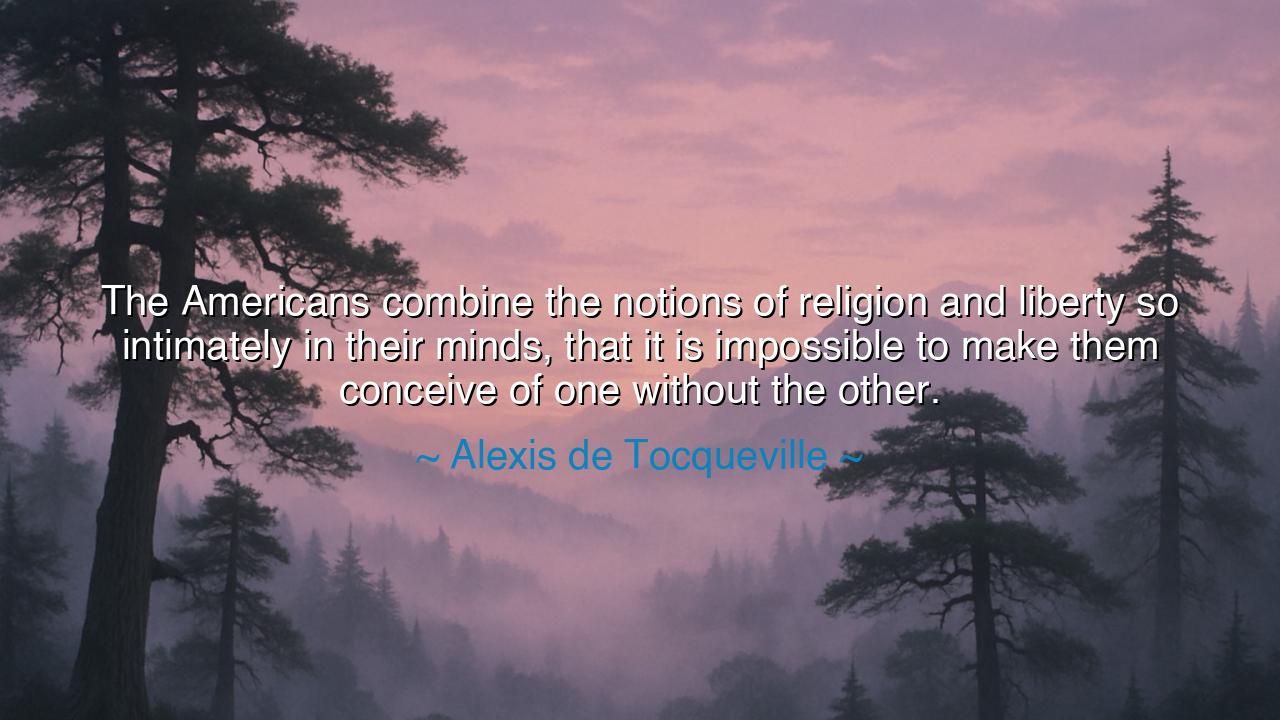
The Americans combine the notions of religion and liberty so
The Americans combine the notions of religion and liberty so intimately in their minds, that it is impossible to make them conceive of one without the other.






In the calm observation of a foreign eye, Alexis de Tocqueville, the great French philosopher and traveler, once declared: “The Americans combine the notions of religion and liberty so intimately in their minds, that it is impossible to make them conceive of one without the other.” These words, born of his travels through the young United States in the early nineteenth century, are not merely political commentary — they are a revelation about the deep union between faith and freedom in the human spirit. Tocqueville saw what many could not: that in America, religion was not the enemy of liberty, but its foundation; not its rival, but its guardian.
The origin of this quote lies within Tocqueville’s masterpiece, Democracy in America, a work that sought to understand the heart of the new world’s democracy. As a Frenchman raised amid the ruins of revolution and tyranny, Tocqueville was astonished to find in America a society where religious conviction and political freedom existed not in conflict, but in harmony. In Europe, the two had long been at war — the Church allied with monarchs, liberty born in rebellion. But in America, the people prayed and governed themselves at once. Tocqueville discerned that this harmony was not an accident, but the very secret of America’s strength: that its liberty was moral, and its morality was free.
When Tocqueville wrote that Americans “combine the notions of religion and liberty,” he was describing a truth larger than one nation. He saw that the human heart yearns for both order and freedom — that liberty without virtue collapses into chaos, and virtue without liberty hardens into tyranny. In the United States, he saw a people whose religious spirit tamed their freedom with conscience, and whose love of freedom kept their faith from becoming oppression. It was, he realized, a delicate balance, yet one sustained by belief — the belief that man is both a creature of God and the steward of his own destiny.
Consider, for a moment, the founding generation — men like George Washington, who in his farewell address declared that “religion and morality are indispensable supports” of a free nation. Washington, though not a zealot, knew that freedom alone was a dangerous fire. It must be tempered by the inner discipline of conscience, which faith provides. The founders did not establish a theocracy; they enshrined the right to believe or not to believe. But they understood what Tocqueville would later see: that a free people must also be a moral people, or their liberty would devour itself.
And so it was that churches in the early Republic became the guardians of virtue, not through force, but through influence. They taught charity, responsibility, humility — the virtues that sustain self-government. Tocqueville marveled that religion, far from restraining democracy, preserved it. It reminded the citizen that liberty was not license, and that freedom did not mean the right to do as one pleased, but the duty to do what was right. In this way, faith became the invisible structure beneath the visible republic — the conscience of the commonwealth, the unseen compass pointing liberty toward justice.
But Tocqueville’s words carry a warning as well as praise. He knew that if a nation ever severs its religious spirit from its love of freedom, both will wither. When liberty loses its moral root, it becomes selfish; when faith loses its freedom, it becomes cruel. The health of a society depends on their sacred marriage — each guarding the other from corruption. History confirms this truth: in lands where faith was silenced, freedom died in its silence; and in lands where faith ruled by the sword, the soul of freedom suffocated beneath dogma.
The lesson, then, is eternal: liberty and faith must walk hand in hand. A free people must cultivate virtue not through coercion, but through conviction — through the inner law written upon the heart. Let no man imagine that laws alone can keep a nation upright; without moral fiber, even the mightiest republic rots from within. And let no priest or ruler seek to chain the conscience, for faith imposed by force is faith destroyed. The strength of a people lies in the voluntary goodness of its citizens — in the quiet harmony between their devotion to God and their devotion to freedom.
So, my children, remember this truth that Alexis de Tocqueville saw with such clarity: a nation that forgets its soul cannot preserve its freedom. If liberty is the body of civilization, then religion — not as dogma, but as moral wisdom — is its breath. Live, then, as citizens both free and faithful. Guard your conscience as fiercely as your rights. For the true greatness of a people is not measured by the power of its laws, but by the depth of its virtue — and the union of faith and freedom that keeps both alive.






AAdministratorAdministrator
Welcome, honored guests. Please leave a comment, we will respond soon